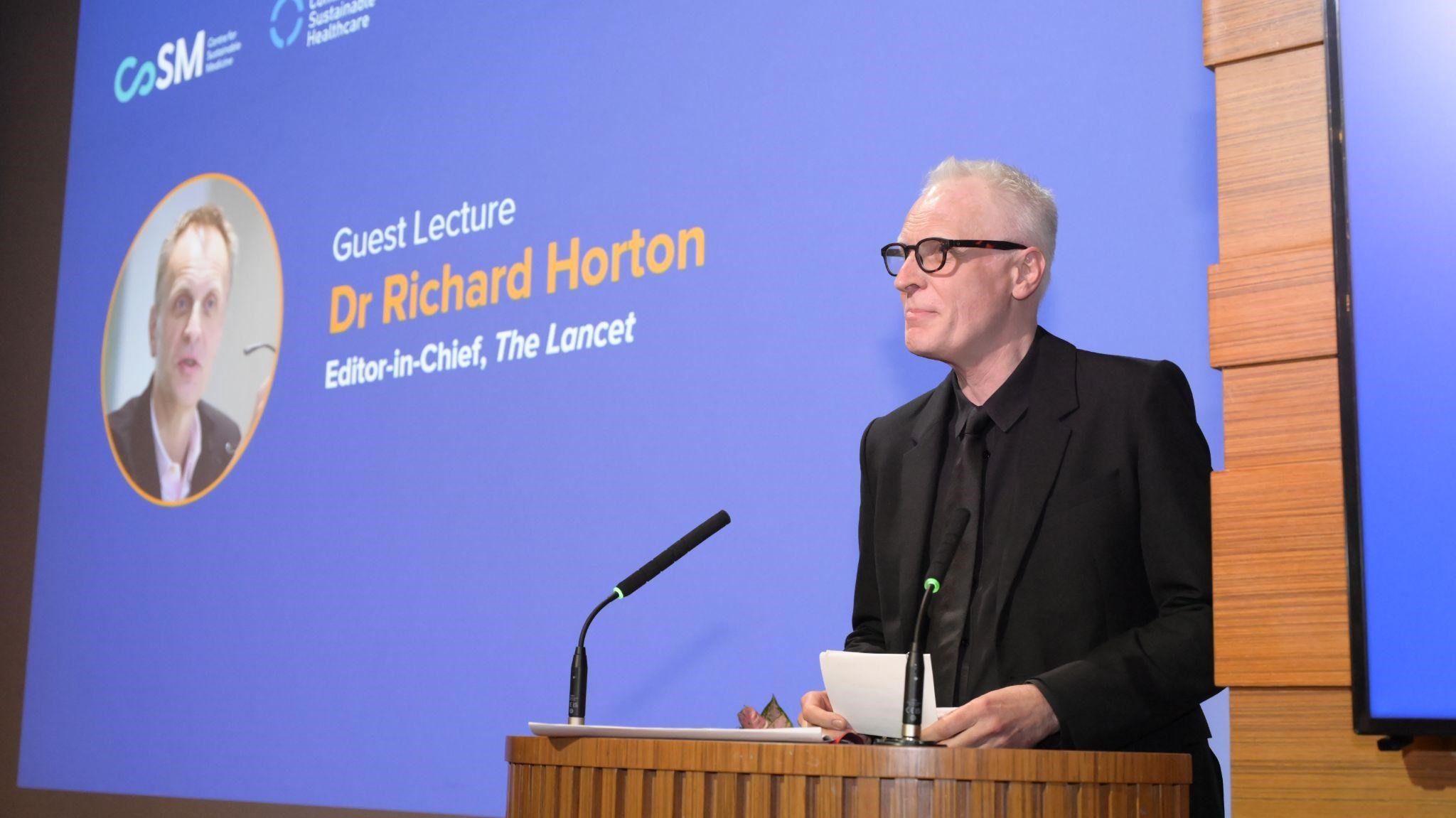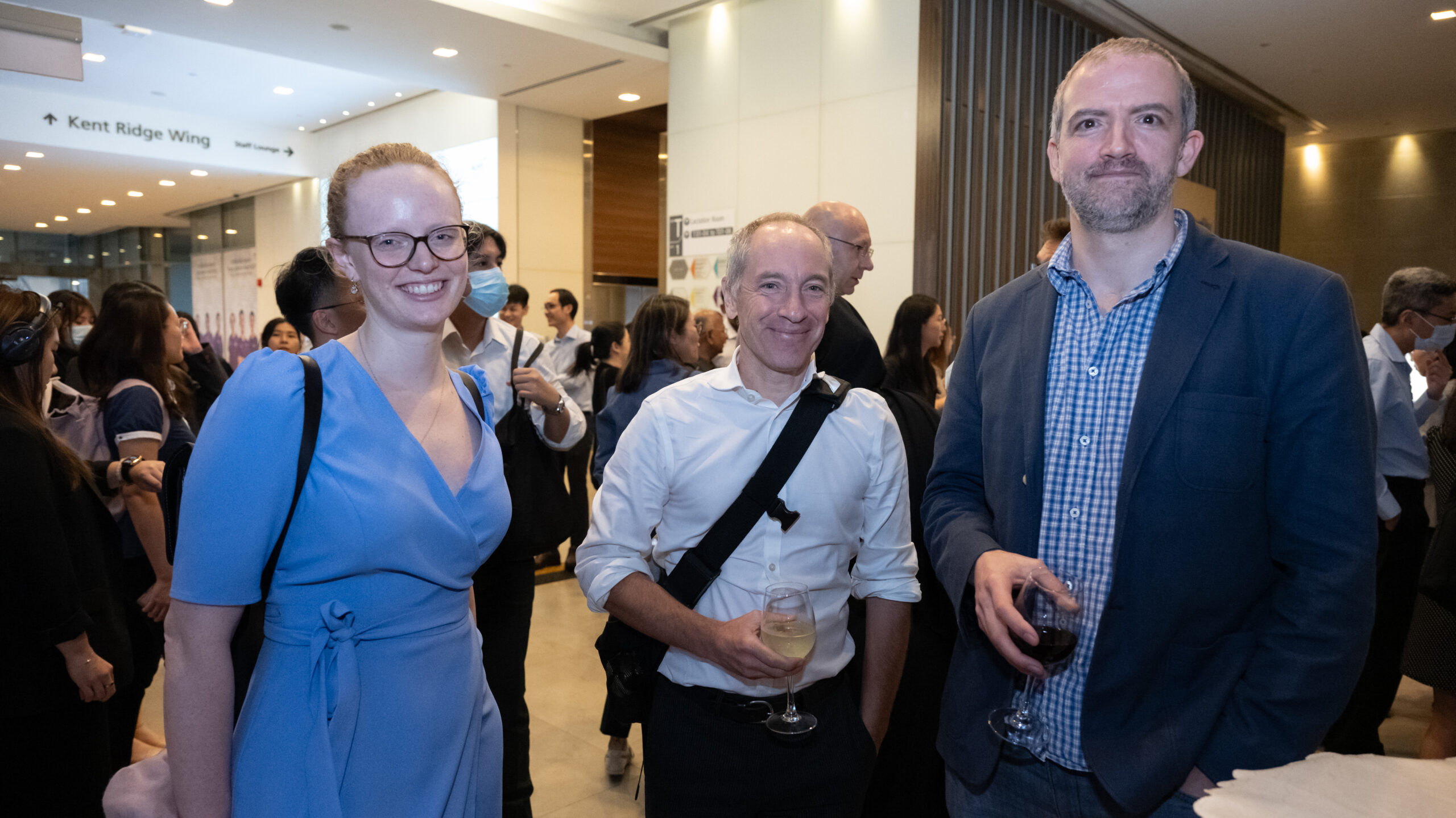The urgency of climate action in healthcare: Editor-in-Chief of The Lancet speaks at Singapore’s launch of the Centre for Sustainable Medicine
Published: 19 Mar 2024

Dr Richard Horton, Editor-in-Chief of The Lancet, delivering a guest lecture at Singapore’s launch of the Centre for Sustainable Medicine on March 13, 2024.
Climate change is the biggest health threat of the 21st century, and deploying net zero healthcare is not an option but a necessity. Health professionals in Singapore deeply echo this view, as 82% of them support action towards a sustainable healthcare system.
To facilitate this into action, the Centre for Sustainable Medicine (CoSM) at the Yong Loo Lin School of Medicine (NUS Medicine) hosted its inaugural public plenary, themed “Driving Net Zero Healthcare in Asia and Across the World” on 13 March 2024. The event drew an audience of more than 350.

It served as a platform in which local leaders and distinguished guests from the Lancet Commission on Sustainable Healthcare (LCSH) shared their envisioned next steps towards a sustainable, net zero carbon healthcare system.

Prof Chong Yap Seng, Dean of NUS Medicine presenting a token of appreciation to Dr Amy Khor, Senior Minister of State for Sustainability and the Environment
Also in picture: Prof Nick Watts, Director of CoSM, NUS Medicine, Dr Richard Horton, Editor-in-Chief of The Lancet, and Dr Amanda Zain, Deputy Director of CoSM
Dr Amy Khor, Senior Minister of State for Sustainability and the Environment, graced the event as the Guest-of-Honour in support of the launch of the CoSM and its inaugural public plenary. Opening the event, both Dr Khor and Prof Chong Yap Seng, Dean of NUS Medicine, in their respective addresses, spoke about the current state of the climate and its effects on Singapore, Singapore’s current strategies to improve its sustainability performance, and the importance of CoSM’s work.
Dr Richard Horton, Editor-in-Chief of The Lancet, kickstarted the public plenary with a guest lecture. He discussed the impact of healthcare on climate change, how a warming planet affects human health and exacerbates global inequities, such as poverty, as well as the moral responsibility of the healthcare profession to take corrective action.
Spotlighting the role of health professionals, Dr Horton also elaborated on how healthcare professionals can lead change, in the move to a net zero future.
He brought up health as a unique and unifying indicator of progress, especially in the field of sustainability, and stressed the importance of taking a holistic approach to sustainability, by thinking about complex interdisciplinary strategies.
“The technologies and capabilities we have today in furthering our goals in sustainable medicine are more advanced than ever, but the challenge for us now is to recognise the situation we are in, in order to mobilise and inspire development in the sustainable healthcare field,” said Dr Horton.

(From left to right) Mr Assaad W. Razzouk, Chief Executive Officer of Gurīn Energy, Associate Professor Benita Tan, Co-Chair of the SingHealth Office of Sustainability, Ms Woo QiYun, Sustainability Consultant, Unravel Carbon Science & Environment, and Associate Professor Andrea MacNeill, Co-Chair of the Lancet Commission on Sustainable Healthcare, sharing the stage during the panel discussion. (Not in photo) A/Prof Eugene Liu, Head of Sustainability Office, National University Health System, was also part of the panel.
The panel discussion featured local and international leaders from healthcare, health policy, and the sustainability sectors, sharing more on strategies that institutions can take to move towards the net zero goal.
A key point discussed was the myth of competing priorities between patients and doctors, when it comes to enforcing sustainability in healthcare. The panelists highlighted that working towards a sustainable healthcare system does not reduce the quality of patient care, but rather seeks to reinvent or change processes to reduce waste, while maintaining— and even improving— the quality of care.
 Following the plenary session, both panelists and audience members were treated to a delightful cocktail dinner. Against the backdrop of engaging discussions, attendees enjoyed a networking mingle focused on healthcare decarbonisation, fostering meaningful connections and collaborative opportunities.
Following the plenary session, both panelists and audience members were treated to a delightful cocktail dinner. Against the backdrop of engaging discussions, attendees enjoyed a networking mingle focused on healthcare decarbonisation, fostering meaningful connections and collaborative opportunities.





 Following the plenary session, both panelists and audience members were treated to a delightful cocktail dinner. Against the backdrop of engaging discussions, attendees enjoyed a networking mingle focused on healthcare decarbonisation, fostering meaningful connections and collaborative opportunities.
Following the plenary session, both panelists and audience members were treated to a delightful cocktail dinner. Against the backdrop of engaging discussions, attendees enjoyed a networking mingle focused on healthcare decarbonisation, fostering meaningful connections and collaborative opportunities.